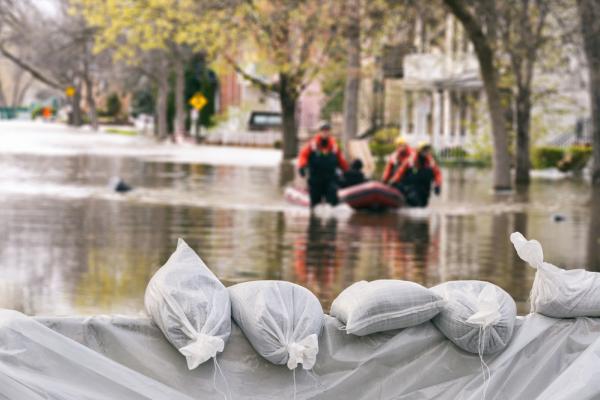Editor’s Note: This article has been adapted from a testimony delivered on Thursday, April 4, before the U.S. House of Representative’s Select Committee on the Climate Crisis.
My fascination with creation began ever since I started to speak. My very first words — which were in Chinese, my heart language — were 出去, which means, “go outside.” When I learned to read, I had stacks upon stacks of wildlife binders, and I scrutinized every new animal card I received each week. There were seasons of my life devoted to poisonous frogs, another to Michigan birds, and yet another to fish. As a child, I was rapt with wonder and curiosity at the richness of wildlife, plants, colors, and textures that can be found in God’s creation. When I became overwhelmed, I retreated to my neighborhood parks, which served as a sanctuary for me, a place I could communicate with God and be myself. I still do. The practice of the presence of God in creation opens up my imagination, my senses, and teaches me to listen.
“But ask the animals, and they will teach you, or the birds in the sky, and they will tell you; or speak to the earth, and it will teach you, or let the fish in the sea inform you. Which of all these does not know that the hand of the LORD has done this? In his hand is the life of every creature and the breath of all mankind,” reads Job 12:7-10.
The scriptures erupt with poetic song in mention of God’s deep and abiding love and connection with every corner of creation. Psalm 19:1 says, “The heavens proclaim the glory of God, the skies display his craftsmanship.” Genesis 2:15 says that “the Lord God took the man and put him in the Garden of Eden to cultivate it and take care of it.” In the original Hebrew, these two words are avad and shamar, which mean to serve and to protect. To me, it is clear that God has entrusted this great gift of creation to us with the responsibility to steward it with utmost intentionality and care. The earth is the very first gift we are bestowed and, in fact, our first commandment is to tend it and to take care of it.
I love people. I can see the imago dei, the image of God, uniquely reflected in each person I meet. I believe that scripture could not be more clear about God’s command to love our neighbors as ourselves. Throughout scripture, Jesus lovingly lays hands on people who have been shunned; he heals them and spends precious time with them. Jesus goes so far as to sacrifice himself to the point of death to “reconcile to himself all things, whether things on earth or things in heaven, by making peace through his blood, shed on the cross” (Colossians 1:15-20).
The first time I learned that our earth was out of balance was in my Environmental Science class in school. As I listened to stories about thousands of species going extinct, entire forests being cleared, and how weather patterns were being hijacked by climate change, I was shaken to my core and enraged that we could allow — and even cause — these things to happen. The earth is the one home we all have, and it is God’s very first and very wonderful gift to us.
When I attended undergrad at the University of Michigan, I decided to continue exploring environmental issues. It was during this time that the Flint, Mich., water crisis unfolded right next door to us. I listened in utter shock and dismay as my classmates shared about their families having no choice but to drink and bathe in water lined with lead. We organized daily water bottle drives to be sent to the people in Flint and launched campaigns to fundraise for a permanent solution to fixing the corrosive water pipes. I learned that 60 percent of Flint’s population was made up of people of color, and 40 percent were under the poverty line. I had heard about environmental issues affecting people negatively, but in this period of my life I began to understand more fully what environmental injustice looked like in real time.
I stand before Congress as the Climate Justice coordinator at Sojourners and serve as Co-Chair for the Steering Commitee of Young Evangelicals for Climate Action. After the Flint water crisis, I saw with new eyes that ecological issues are not one-off, siloed problems without consequence to people’s lives. As I grow deeper in my journey of loving God and neighbor, I continue to witness the upending of livelihoods that my brothers and sisters are already facing — both here in our very communities and all over the world — as a direct result of the climate crisis.
Just last week, historic flooding following a bomb cyclone in Nebraska killed three people and ravaged several homes. The catastrophic Cyclone Idai killed 750 people and displaced 100,000 in Mozambique, Zimbabwe, and Malawi. California wildfires last year were the deadliest, most destructive wildfires ever on record and killed 104 people. Indeed, we are seeing deadly, unprecedented extreme weather events almost on a weekly basis now, all of which are exacerbated and heightened by climate change. The impact of the climate crisis are hitting our most vulnerable neighbors first, the very ones Jesus loved to draw close to. People of color, women, people living under the poverty line, and the younger generations are already bearing the brunt of the climate crisis.
No wonder young people care, including me. We are the first generation who will experience the most intense impacts of this humanitarian crisis, and our livelihoods are in jeopardy. Creation and people — both of which God deeply loves — are in peril and it breaks my heart. Romans 8:22 says, “The whole creation has been groaning as in the pains of childbirth right up to the present time.”
As a Christian, I believe God calls us to a total and radical re-imagination and transformation of our relationship with others and the earth. We yearn for a vision of complete reconciliation for all of God’s created order. As political leaders, especially those of you grounded in faith and values, I implore you to respond faithfully and with full force to love God and neighbor by enacting just, compassionate, and transformative climate policies that rise to the challenge of the climate crisis.
We don’t have a lot of time. Congress, I invite you to dream beyond deeply-rooted partisanship into co-creating a world of wholeness together. We can begin to practice the cultivation of wholeness in our communities by addressing the climate crisis faithfully and with the full attention it demands of us. This would be a tangible fulfillment of the commandment to love our neighbors as ourselves, and of the first commandment given by God in the book of Genesis: to serve and protect the earth. That is my prayer for you.
Got something to say about what you're reading? We value your feedback!






